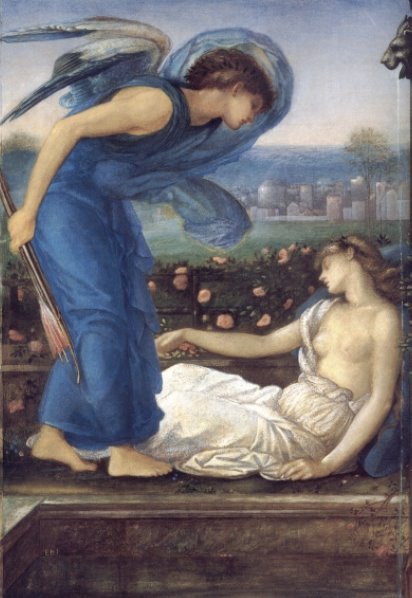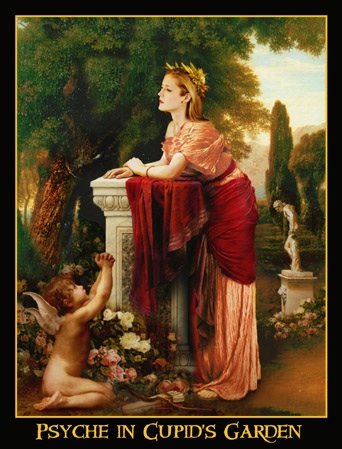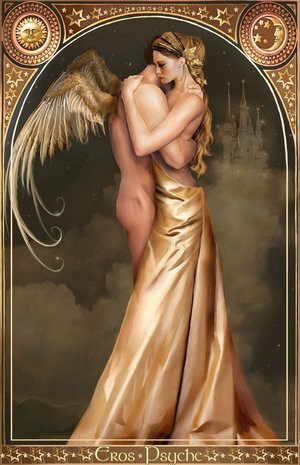The Tale of Soul and Love, part III
The very next day, after Eros has left at dawn, Psyche runs outside the palace and already hears her sisters wailing for her high above. As her husband had promised Zephyr yields to her request and carries them safely to the enchanted valley below. After joyful embraces she leads them inside the supernaturally beautiful palace. She describes her happiness and that she carries the fruit of her love in her womb.
But her sisters have plans of their own, and seek to twist their envy into her; to punish Psyche for her pride and because of their bitter and unhappy lots in life and marriage. “If she is to give birth to a god I might go ahead and just hang myself!”, one proclaims. They create the doubt and fear in her mind that she is married not to the dark and mysterious god-like form she knows, but to a hideous and terrible serpent that is merely waiting to devour their child whole after its birth. She eventually concedes to the power of their persuasion and admits to her sisters that she has actually never seen his daylight form. They instruct Psyche to set upon her husband while he sleeps, with a lamp and a blade, as she’d been warned that they would.
But when the fated night comes the flame of her lantern reveals the form of none other than Eros himself. Beside the bed she sees his divine paraphernalia; the quiver and arrows of the trickster himself! Psyche gazes upon him in surprise and for the first time Love fully enters into her heart with full wings. But her startled hand shakes a drop of the burning lantern oil and burns Eros’ shoulder. He awakens and seeing her there with the blade and lamp, turns angrily to the window to disappear into the night sky. But Psyche, embracing him, sobbing holds on to his leg as he lifts into the air. As she falls from him, he lands in a nearby cypress tree. He reveals to her that he has disobeyed his mother Venus’ command to destroy Psyche, having struck himself with his own arrow. In faith to the fairytale mode, he reminds our hero that she was often warned of the danger that she is in. And now, her sisters would pay dearly, while she, our Psyche would be punished by Eros’ running away.
to be continued
The Tale of Soul and Love, part II
As we have learned, Eros never allows Psyche to see his form in the light. But as Apuleius describes in The Golden Ass, “there was no part of him that could not be apprehended by her senses, by hands and ears if not by eyes.” She continues this fairy tale existence for some time, although she worries for her parents. She pleads her case to Eros, her sorrow at their state of unknowing about her fortunate turn of events on the mountaintop. Eros warns her repeatedly that her path will bring her only sorrow, yet like a good fairytale character, she does not heed the ominous warnings. And so he eventually concedes and promises that Zephyr will help her sisters descend into the enchanted valley where her palace hides. But he does so on the condition that she not allow her sisters to convince her to seek out the physical form of her husband. She replies that she “would die a hundred deaths, before I would deprive myself of this sweet, sweet marriage to you. For I love you, whoever you are, and I am out of my mind in longing for you as for my own life’s breath; I wouldn’t even pit Cupid against you.” She wraps him in her kisses and praises and the two are happy until dawn, when he is gone. to be continued...
(all quotes used are from Joel. C. Relihan’s 2007 translation of Apuleius’ The Golden Ass )
The tale of Soul and Love, part One
A beautiful girl is born and her name is Psyche. When she grows to become a woman her fame spreads. Far and wide the people come to pay homage to this unearthly beauty. Some begin to worship Psyche instead of the goddess Aphrodite, which leaves the goddess enraged. She sends her son, Cupid, or Eros to shoot his amorous darts into her while she would be gazing upon the Earth’s most hideous man, making her fall helplessly in love with the beast. But Eros, like the mortals, falls for her instead.
Meanwhile, no mortal will dare to approach Psyche for her hand in marriage. She is only worshiped as an idol or Aphrodite on Earth. Her parents consult an oracle, and are told to leave her on a nearby mountain cliff. After she is left there alone Zephyr the west wind, at Eros’ order, blows her gently down to the valley below. In the valley Psyche finds that a marvelous and enchanted palace awaits her, seemingly unoccupied. But within she is attended by unseen servants, in the palace whose beauty is only surpassed by its wondrous garden. At dusk, the promised groom Eros arrives but does not reveal his immortal identity. He warns Psyche to never light any lamps and leaves their chambers the next morning before dawn. This happens night after night; their love is born and the mystery surrounding who she is actually loving grows stronger in the daytime thoughts of Psyche…… to be continued
Meanwhile, no mortal will dare to approach Psyche for her hand in marriage. She is only worshiped as an idol or Aphrodite on Earth. Her parents consult an oracle, and are told to leave her on a nearby mountain cliff. After she is left there alone Zephyr the west wind, at Eros’ order, blows her gently down to the valley below. In the valley Psyche finds that a marvelous and enchanted palace awaits her, seemingly unoccupied. But within she is attended by unseen servants, in the palace whose beauty is only surpassed by its wondrous garden. At dusk, the promised groom Eros arrives but does not reveal his immortal identity. He warns Psyche to never light any lamps and leaves their chambers the next morning before dawn. This happens night after night; their love is born and the mystery surrounding who she is actually loving grows stronger in the daytime thoughts of Psyche…… to be continued
Welcome to Psyche's Garden
This first painting that you are now enjoying is Psyche Opening the Door into Cupid's Garden, by John William Waterhouse (1904).
Welcome to Psyche's garden, may you be attended by Love. Welcome home dear friend, to the garden that is open to both human and immortal friends. This is a garden of mysticism and of knowledge. We are devoted to the quest for human elevation to the immortality that the beautiful human, Psyche, achieved through her love and labors.
We will explore the mythos of Psyche and Love, as well as the eternal and ever-present inspiration of the story of Psyche and Love in art and in literature.
Eros and Psyche can mirror, love, idolize, or inspire the other. This interaction also becomes like the meanings to their names, Love and Soul, Eros and Psyche. This is what it means to refer to the symbolic interplay of Cupid and Psyche as Love and Soul. This relationship of Love and Soul, Eros and Psyche, is the key to understanding the symbolism of the mythos of Psyche; her journey through the underworld, the water of death, reuniting with her beloved Eros, the ambrosia of immortality, her transcendence to the immortal pantheon of god-like archetypes—none of these elements of the mythos can be fully understood apart from the relationship of Love and Soul.
Stay connected- next time we will review the compelling story of Psyche and Eros
Welcome to Psyche's garden, may you be attended by Love. Welcome home dear friend, to the garden that is open to both human and immortal friends. This is a garden of mysticism and of knowledge. We are devoted to the quest for human elevation to the immortality that the beautiful human, Psyche, achieved through her love and labors.
We will explore the mythos of Psyche and Love, as well as the eternal and ever-present inspiration of the story of Psyche and Love in art and in literature.
Eros and Psyche can mirror, love, idolize, or inspire the other. This interaction also becomes like the meanings to their names, Love and Soul, Eros and Psyche. This is what it means to refer to the symbolic interplay of Cupid and Psyche as Love and Soul. This relationship of Love and Soul, Eros and Psyche, is the key to understanding the symbolism of the mythos of Psyche; her journey through the underworld, the water of death, reuniting with her beloved Eros, the ambrosia of immortality, her transcendence to the immortal pantheon of god-like archetypes—none of these elements of the mythos can be fully understood apart from the relationship of Love and Soul.
Stay connected- next time we will review the compelling story of Psyche and Eros
Subscribe to:
Comments (Atom)






.jpg)
.jpg)
+(Procession+accompanying+Psyche+as+she+goes+to+marry+the+monster).jpg)
